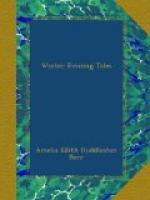Early in the evening, just as the sun was setting and the cows were coming lowing up the little lane, scented with the bursting lilac bushes, she stood humbly at the gate her father must pass in order to go to the hillside fold to shelter the ewes and lambs. Very soon she saw him coming, his Scotch bonnet pulled over his brows, his steps steadied by his shepherd’s staff. His lips were firmly closed, and his eyes looked far over the hills; for David was a mystic in his own way, and they were to him temples not made with hands in which he had seen and heard wonderful things. Here the storehouses of hail and lightning had been opened in his sight, and he had watched in the sunshine the tempest bursting beneath his feet. He had trod upon rainbows and been waited upon by spectral mists. The voices of winds and waters were in his heart, and he passionately believed in God. But it was the God of his own creed—jealous, just and awful in that inconceivable holiness which charges his angels with folly and detects impurity in the sinless heavens. So, when he approached the gate he saw, but would not see, the dying girl who leaned against it. Whatever he felt he made no sign. He closed it without hurry, and then passed on the other side.
“Father! O, father! speak one word to me.”
Then he turned and looked at her, sternly and awfully.
“Thou art nane o’ my bairn. I ken naught o’ thee.”
Without another glance at the white, despairing face, he walked rapidly on; for the spring nights were chilly, and he must gather his lambs into the fold, though this poor sheep of his own household was left to perish.
But, if her father knew her no more, the large sheep-dog at his side was not so cruel. No theological dogmas measured Rover’s love; the stain on the spotless name of his master’s house, which hurt the old man like a wound, had not shadowed his memory. He licked her hands and face, and tried with a hospitality and pity which made him so much nearer the angels than his master to pull her toward her home. But she shook her head and moaned pitifully; then throwing her arms round the poor brute she kissed him with those passionate kisses of repentance and love which should have fallen on her father’s neck. The dog (dumb to all but God) pleaded with sorrowful eyes and half-frantic gestures; but she turned wearily away toward a great circle of immense rocks—relics of a religion scarcely more cruel than that which had neither pity nor forgiveness at the mouth of the grave. Within their shadow she could die unseen; and there next morning a wagoner, attracted by the plaintive howling of a dog, found her on the ground, dead.
There are set awful hours between every soul and heaven. Who knows what passed between Lettice Todd and her God in that dim forsaken temple of a buried faith? Death closes tenderly even the eyes full of tears, and her face was beautiful with a strange peace, though its loveliness was marred and its youth “seared with the autumn of strange suffering.”




